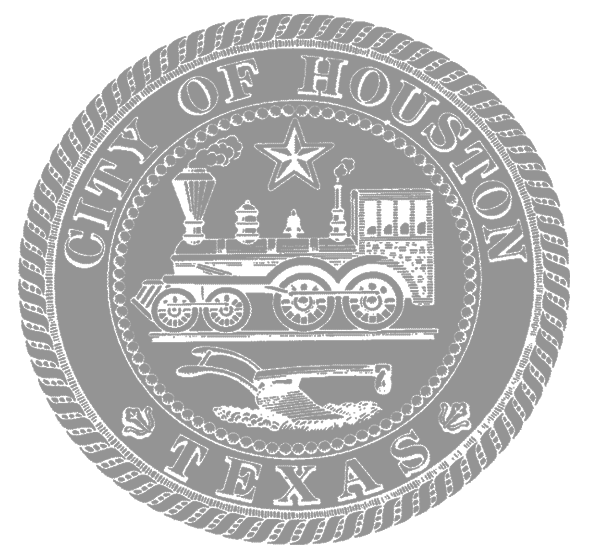| | | | | | | |  |
CITY OF HOUSTON - CITY COUNCIL
Meeting Date: 12/2/2014
ALL
Item Creation Date: 9/29/2014
FIN-Amending ORD & restating the Financial Policies adopted by ORD No. 2003-474
Agenda Item#: 65.
| |
|
| | | | | | | | Summary:
ORDINANCE amending and restating the City of Houston’s Financial Policies adopted by Ordinance No. 2003-474
DELAYED BY MOTION #2014-1016, 11/19/14
This was Item 31 on Agenda of November 19, 2014
|
| | | | | | | | Background:
Approval of this ordinance will strengthen the City’s financial policies for financial reserves, long-term forecasting and planning, improved internal controls, and enhanced transparency and accountability in stewardship of public funds. The policies as proposed require that the proposed budget and Capital Improvement Plan each year include statements indicating whether they comply with each relevant policy; the adopted budget is to include a listing of the financial policies indicating whether the City is in compliance with each. Where compliance is not attained, the budget shall also include a state explaining the non-compliance and outlining a plan for compliance. The policies are to be reviewed at least every two years. Per the proposed ordinance, the policies are to take effect with the Proposed Budget for FY 16 and shall be reflected in the Adopted Budget for FY 16 unless stated otherwise in the policies as adopted. Other highlights include:
-
General Fund Reserve Policies
- Setting the City's desired minimum unassigned Fund Balance at 7.5 percent of annual expenditures (excluding debt service) and establishing standards for use of Fund Balance.
- Renaming the Rainy Day Fund as the Budget Stabilization Fund, and amending the current $20 million minimum to be “an amount not less than the greater of (a) 1 percent of expenditures (excluding debt service payments) or (b) $20 million.”
-
Enterprise Funds Reserve Policies
- Requiring each enterprise fund to have an appropriate written methodology for determining minimum and maximum cash reserves.
-
Internal Service Fund - Health Benefits Fund Reserve Policies
-
Operating Budget Policies – Revenues and Expenditures
- Requiring annual presentation to and adoption by City Council of a balanced operating budget for the coming fiscal year.
- Making clear that all post-employment and employee benefit systems will be financed in a manner that fully and systematically funds all liabilities, with Council to be informed if sufficient funds are not allocated in the budget.
- Requiring a comprehensive analysis of City fees and rates (except impact fees) at least every five years by an outside independent third-party entity (fees and rates may still be adjusted by ordinance in the interim under certain conditions).
- Requiring a City employee compensation study by an outside independent third-party entity at least every three years.
- Increasing funding for Operating Maintenance of facilities/fleet/equipment/technology by at least 0.25 percent of Current Replacement Value (CRV) annually until funding reaches 2 percent of CRV.
- Monitoring compliance with City Financial Policies through statements in annual proposed budget ordinances indicating whether the budget is in compliance, explaining any non-compliance and outlining a corrective plan.
- Requiring a Fiscal Note for any Request for Council Action seeking funding not in the adopted budget, with the Fiscal Note to include information on program/project start-up cost, projected maintenance and operating costs for a minimum of five years, and identification of budgetary savings or other funding source to meet funding needs.
-
Capital Asset Management Policies
- Highlighting long-term impacts of capital investment by including in the annual Capital Improvement Plan (CIP) a five-year operating budget impact project for all projects proposed.
- Prioritizing Asset Renewal and Replacement of existing facilities over new projects, and increasing dedicated capital funding for maintenance with a requirement that for new facilities or major renovations, 2 percent of the CRV is to be included in subsequent CIPs until the facility is sold or disposed of.
-
Long-Term Financial Planning Policies
- Developing a five-year General Fund forecast in advance of the proposed budget, to include in-depth analysis of revenues, expenditures and long-term obligations along with a plan for eliminating projected deficits that would prevent a Balanced Budget in any of the five years; and identifying requirements and options for achieving a Structural balanced budget for the upcoming fiscal year and the subsequent fiscal year.
-
Debt Management Policies
- Establishing a minimum Debt Service Fund Balance related to debt secured by ad valorem taxes, and limiting debt financing of more than one year to capital expenditures for assets/improvements exceeding $50,000 cost and three years’ useful life.
- Initiating a gradual reduction in the maximum allowable General Fund transfer for debt service from 20 percent to 10 percent of total General Fund revenues (excluding state and federal grants).
- Containing debt life by specifying that projects are not to be financed over a period that exceeds their average expected life span, setting a target of 12 years or less for average weighted General Obligation bond maturities, and stipulating that debt refundings are not to extend the refunded bonds’ final maturity without a two-thirds vote of City Council.
- Instituting a formal Request for Information process at least annually in selection of underwriters.
-
Accounting, Auditing and Financial Reporting Policies
- Establishing standards for audits of grant funds and City finances, and for preparation of annual financial statements, as well as for prompt release and publication of the annual audit and accompanying letter.
-
Local Economic Development Finance Policies
- Setting priorities for economic development emphasis, and requiring regular analyses and evaluation of market and business conditions.
- Setting out minimum components of applications for economic development project incentives and for standardized evaluation of same.
- Requiring an annual report to BFA detailing the progress of each active project.
|
| | | | | | | | Prior Council Action:
Ordinance 2003-474 |
| | | | | | | | Contact Information:
Tantri Emo, Deputy Director
Phone: 832-393-9076 |
|